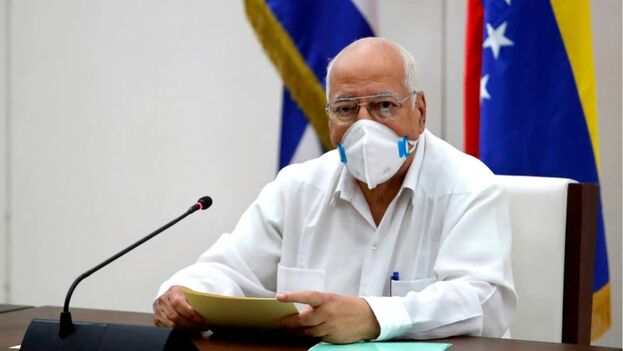
![]() 14ymedio, Elías Amor Bravo, Economist, 3 May 2023 — The old guys, you already know. Cuba’s new deputy prime minister and, at the same time, minister of foreign trade and foreign investment, Ricardo Cabrisas, who replaced the all-powerful Malmierca at the head of the leadership of the wealth economy in Cuba, has debuted in office with the signing of a series of agreements with the Russian presidential adviser Máxim Oreshkin to, according to the state press, “deepen bilateral economic relations and carry out projects in sectors of mutual interest.”
14ymedio, Elías Amor Bravo, Economist, 3 May 2023 — The old guys, you already know. Cuba’s new deputy prime minister and, at the same time, minister of foreign trade and foreign investment, Ricardo Cabrisas, who replaced the all-powerful Malmierca at the head of the leadership of the wealth economy in Cuba, has debuted in office with the signing of a series of agreements with the Russian presidential adviser Máxim Oreshkin to, according to the state press, “deepen bilateral economic relations and carry out projects in sectors of mutual interest.”
In the end, if you look beneath the surface a little, you can see that they are the same agreements that the delegation headed by Díaz-Canel had on the table during the visit to Moscow last year. This type of news is part of a propagandist sequence that, for the regime, and in particular for Díaz-Canel, is phenomenal, throwing balls off the field to gain time. In the end, Cabrisas has been, and is, an expert in this art, and therefore no one has great expectations of what the presence of the Russian delegation on the Island means. It is nothing more than another example of the relationship between the two countries, even in very delicate moments like the current one, in which there are questions about Putin and rejection of the war in Ukraine.
In this case, Cuba has decided to accompany Putin in this adventure and go to the end, if necessary, although this will earn it international disapproval. We will see this in the coming months. Díaz-Canel was in charge of making Cuba’s position very clear: “Convey an affectionate greeting to Putin, whom we thank for the support that the Russian Federation has given us in the fight against the blockade.”
For his part, Cabrisas was happy, although he knows that these operations are limited and can end as quickly as they are announced. So he dedicated himself to stating to the media what everyone knows. “Russia constitutes for Cuba the second commercial partner at the regional level and the fifth at the global level, with a growing trend of commercial exchange since 2017.” Well, and what good is that for the Cubans? Have they seen their living conditions improve?
Díaz-Canel stressed that “the presence of this Russian delegation in the Greater Antilles has a lot of significance and gives continuity to the exchange of high-level visits that has been maintained over the course of recent months.” In his opinion, “it marks an intention of follow-up, of continuity to all the agreements that we have established as a whole, and is another expression of the deepening of bilateral relations between our governments and our peoples, which are historic and characterized by a high level of political dialogue, of coincidence on many points of the international agenda and of joint support in international forums on various topics.” But really, to date, very little of what was agreed has been put into practice.
And related to this, the Cuban minister had the idea of asking for the creation of a “regular maritime service, Russia-Latin America or Russia-Caribbean, for which Cuba has a maritime port, air and road infrastructure that could allow connectivity, both internally and abroad, but that needs modernization.” Doesn’t that regular maritime service exist after the three decades of relationship between Cuba and the former USSR? Cabrisas should ask himself why not, and if really the Russian economic hierarchs and the global freight forwarders favor the work.
A good example of the projects is that, once again, energy, agro-industrial, financial and tourism areas are cited, that Cuba wants to promote with Russian money and which have not yet taken place. Does anyone know why? There must be a reason.
Putin’s adviser tried to look good, and in the communist state press, “he condemned the U.S. commercial, economic and financial blockade of Cuba” and showed a strange willingness of his country to defend itself together with Cuba from unilateral sanctions imposed by western centers of power on the two countries. As if Cuba were currently being subjected to measures such as those applied to Russia by the invasion of Ukraine. It is important to point out that they have nothing to do with it.
He also said, as if he were a magician, that his country “brought to Cuba a set of investment initiatives, with projects that will seek to contribute to the income of this Caribbean nation.” And he added that they are working on the development of “a new format of relations and interaction to take advantage of the existing potentialities in the Cuban economy” that can be specified in the signing of a protocol between the two countries to establish specific projects that must be put into practice. Well, how long will we have to wait for it? Will it be the same as the small and medium-sized enterprises project?
Doesn’t all this sound like the same thing that was said in Moscow during Díaz-Canel’s visit? This whole issue of Cuba and Russia relations sounds like a broken record. A lot of noise, little substance.
Translated by Regina Anavy
____________
COLLABORATE WITH OUR WORK: The 14ymedio team is committed to practicing serious journalism that reflects Cuba’s reality in all its depth. Thank you for joining us on this long journey. We invite you to continue supporting us by becoming a member of 14ymedio now. Together we can continue transforming journalism in Cuba.
